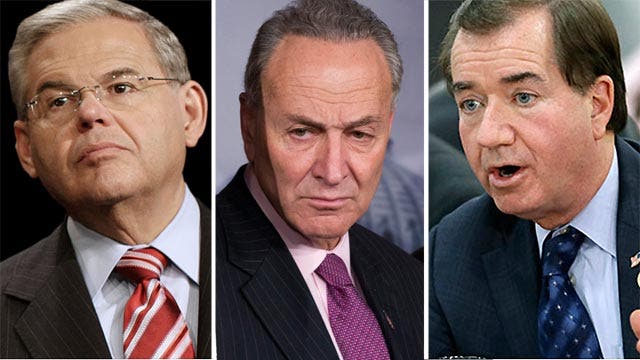Obama defends nuclear deal with Iran from chorus of critics
James Rosen reports from the White House
Bipartisan skepticism in the Senate about the newly announced deal with Iran could mean a renewed push for tougher sanctions -- and a veto showdown with President Obama if the administration cannot ease senators' concerns.
A number of senators, from both sides of aisle, appear to be pushing sanctions as a contingency plan in case the agreement on Iran's nuclear program falters. But some may not be willing to wait -- presenting a problem for the Obama administration, since the deal signed with Iran and five other nations guarantees no new sanctions for six months.
If the Senate gets impatient and plows ahead with new legislation, Obama could be forced to veto -- and risk being overridden.
Sen. Marco Rubio, R-Fla., was among those calling for the pursuit of additional sanctions now, arguing that the interim deal does little to take Iran off the nuclear course.
"There is now an even more urgent need for Congress to increase sanctions until Iran completely abandons its enrichment and reprocessing capabilities," Rubio said.
Other senators want to continue to prepare sanctions legislation, but build into it a six-month window to let the current track play out.
"I expect that the forthcoming sanctions legislation to be considered by the Senate will provide for a six month window to reach a final agreement before imposing new sanctions on Iran, but will at the same time be immediately available should the talks falter or Iran fail to implement or breach the interim agreement," Sen. Bob Menendez, D-N.J., said in a statement.
The deal reached over the weekend would ease roughly $7 billion worth of sanctions. In exchange, Iran would suspend parts of its nuclear program while diplomats try to work out a longer-term deal.
Sen. Bob Corker, R-Tenn., the top Republican on the Senate Foreign Relations Committee, told "Fox News Sunday" that Iran was celebrating because its deal with the U.S. and the five other world powers allows it to continue to enrich uranium while getting billions in crippling sanctions lifted.
"They're spiking the ball in the end zone," Corker said.
He also said his greatest concern was that the Obama administration wouldn't follow through on the terms of the deal -- including daily inspections on Iran's nuclear facilities and ensuring that the country sticks to new thresholds for nuclear enrichment -- below levels toward building a nuclear weapon.
He also repeatedly said he didn't want the interim deal to "become the norm" and suggested Congress is ready to reinstate sanctions and impose more.
Sen. John McCain, R-Ariz., also said Sunday that he'll continue to work with colleagues "to keep the pressure on the Iranian regime, including by action on additional sanctions."
California Sen. Dianne Feinstein, chairman of the Senate Intelligence Committee, offered what appears to be some of the most unequivocal support for the deal.
"I support the agreement ... which I believe is a significant step toward solving one of the most difficult security challenges facing the world today," she said, while also expressing caution. "By any standard, this agreement is a giant step forward and should not be undermined by additional sanctions at this time."





